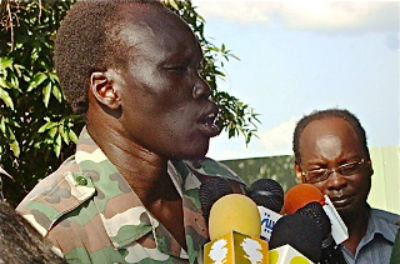 By CHARLTON DOKI, Associated Press
By CHARLTON DOKI, Associated Press
JUBA, South Sudan (AP) — Sudan has supplied weapons and ammunition to rebels fighting neighboring South Sudan’s government, says a report from the Small Arms Survey, an independent Swiss research group.
Sudan denies having links to rebels led by David Yau Yau, who is based in the restive Jonglei state. But the research group says it has evidence Sudan airdropped weapons to the rebels between August and December last year.
The Swiss group released its report on Friday, three days before a joint Sudan-South Sudan committee meets to discuss the prickly issue of rebel groups that are based in both countries.
South Sudan accuses Sudan of supporting Yau Yau’s rebellion in order to block South Sudan’s plans to build an oil pipeline through Ethiopia, said South Sudan’s government spokesman, Barnaba Marial Benjamin. Currently South Sudan can only export its oil using pipelines in Sudan. A dispute over oil transit fees with Khartoum led South Sudan to shut down its oil industry early last year.
In the last month the two governments reached a deal on oil exports through Sudanese facilities. Juba resumed pumping oil with crude expected to reach international markets in May.
"We have Total Oil Company that has got rights to exploit oil in that territory, a company that is ready to go in (but) the Sudan government is not conformable with this. So there are economic strategic reasons why the Sudan government does not want any stability in that area," Benjamin said in a recent interview.
Researchers with the Small Arms Survey went to Pibor in Jonglei state in February where the group says they documented weapons and ammunition in possession of a group led by former rebel commander James Kubrin, who defected with more than a hundred men from David Yau Yau’s militia in December last year. Rebels told the research group that Sudan was the primary supplier of their weapons and ammunitions.
The report said that an examination of the weapons and ammunitions showed they were identical to those commonly used by the Sudanese army.
"One of them is a type of Chinese rifle that has never before been observed in South Sudan called the CQ, which is a copy of an M16 and this has a type of caliber that has not been in use in South Sudan. The second was an A30 RPG-type rocket launcher that is being manufactured by the Yarmouk factory in Sudan," said Jonah Leff, a researcher with the Small Arms Survey.
Rebels also told Small Arms Survey that their military supplies were delivered through airdrops "orchestrated by Sudan’s National Intelligence and Security Service, which they claim took place between August 2012 and December 2012," according to the report.
Defecting rebels claimed that a fixed-wing aircraft flew from Khartoum on the night of each drop and that the militia groups on the ground were in direct contact with the aircraft via satellite phones. The rebels said they marked drop zones with a line of fire immediately prior to the drop, according to the report.
"And if you look at the type of weapons and the amount of ammunitions that Yau Yau’s forces have been employing against the SPLA it is clear that they have needed some use of power and that this would have been impossible for them to bring in by foot and given the road conditions, we know that these were not transported by road. So it seems quite likely that at the time that the only way these weapons could have been transported is by air," said Leff.
Sudanese President Omar al-Bashir said Friday during a visit to South Sudan that he wants peace and normal relations with South Sudan. He denied that his government was supporting rebels in South Sudan.
"So it is not true that the Sudan government is supporting the rebellion of Yau Yau or any other rebellions against South Sudan in the border," Bashir said.
South Sudan accused Yau Yau’s rebels of killing five United Nations peacekeepers from India and seven civilians in an attack on Tuesday. The rebels denied any involvement in the killings.
Yau Yau first rebelled against Juba after he failed to win a parliamentary seat in the 2010 general elections, accusing the ruling party of rigging the elections. In 2011, he accepted an amnesty offer by President Salva Kiir and returned to Juba. But last year he fled to Khartoum and started a rebellion against Juba in his home region of Pibor.
Copyright © 2013 The Associated Press. All rights reserved.

